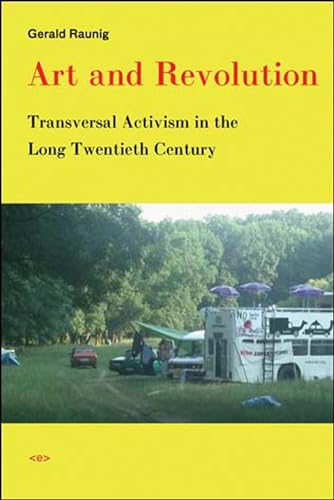Gerald Raunig: Art and Revolution: Transversal Activism in the Long Twentieth Century (2005–) [DE, SR, EN, RU]
Filed under book | Tags: · activism, anarchism, art, art history, poststructuralism, revolution, situationists

“Gerald Raunig has written an alternative art history of the ‘long twentieth century,’ from the Paris Commune of 1871 to the turbulent counter-globalization protests in Genoa in 2001. Meticulously moving from the Situationists and Sergei Eisenstein to Viennese Actionism and the PublixTheatreCaravan, Art and Revolution takes on the history of revolutionary transgressions and optimistically charts an emergence from its tales of tragic failure and unequivocal disaster. By eloquently applying Deleuze and Guattari’s idea of the “machine,” Raunig extends the poststructuralist theory of revolution through to the explosive nexus of art and activism.
As hopeful as it is incisive, Art and Revolution encourages a new generation of artists and thinkers to refuse to participate in the tired prescriptions of marketplace and authority and instead create radical new methods of engagement. Raunig develops an indispensable, contemporary conception of political change—a conception that transcends the outmoded formulations of insurrection and resistance. Too much blood and ink has been shed for the art machines and the revolutionary machines to remain separate.”
Originally published in German as Kunst und Revolution. Künstlerischer Aktivismus im langen 20. Jahrhundert by Turia+Kant, Vienna, 2005. New edition by transversal texts, Vienna, 2017.
English edition
Translated by Aileen Derieg
Publisher Semiotext(e), 2007
Active Agents series
ISBN 1584350466, 9781584350460
319 pages
Reviews and commentaries: Marco Meseriis (Mute, 2008), Rob Myers (Furtherfield, 2009), Nettime discussion (2008), Gray Kochhar-Lindgren (Culture Machine), Beatrice von Bismarck (Texte zur Kunst, DE). Reuben Fowkes (Art Monthly), Karl Reitter (Grundrisse, DE), Ivan Pravdić (Filozofija i društvo).
Author, more
Editor (SR)
Publisher (EN)
Kunst und Revolution. Künstlerischer Aktivismus im langen 20. Jahrhundert (German, new ed., 2005/2017, added on 2024-1-5, EPUB)
Umetnost i revolucija. Umetnički aktivizam tokom dugog XX veka (Serbian, trans. Relja Dražić, ed. kuda.org, 2006, updated on 2015-8-30)
Art and Revolution: Transversal Activism in the Long Twentieth Century (English, trans. Aileen Derieg, 2007, updated on 2017-6-26)
Iskusstvo i revoluciia: khudozhestvennyi aktivizm v dolgom dvadcatom veke (Russian, trans. Eugenia Shraga and Alexander Skidan, 2012, DJVU, 28 MB, updated on 2017-6-26)
Alessio Lunghi, Seth Wheeler (eds.): Occupy Everything! Reflections on why it’s kicking off everywhere (2012)
Filed under book | Tags: · activism, capitalism, education, ideology, production, protest, revolution, social movements

Penned after the 2010 European student unrest and before what is now commonly referred to as the “Arab spring” began to escalate, BBC Newsnight economist Paul Mason’s “20 Reasons Why It’s Kicking Off Everywhere” sought to establish an understanding of the motivations behind these globally disparate, yet somehow connected struggles.
What roles do the “graduate with no future,” the “digital native” or the “remainder of capital” play in the current wave of unrest? What are the ideas, ideologies, motivations or demands driving these movements? How is struggle organized and coordinated in the age of memetic politics and viral ad campaigns?
This collection of essays seeks to further explore Paul Mason’s original 20 Reasons in an attempt to better understand our turbulent present.
Contributors: 500 Hammers – Thomas Gillespie & Victoria Habermehl – The Free Association – Deterritorial Support Group – Ben Lear & Raph Schlembach – Camille Barbagallo & Nicholas Beuret – David Robertshaw, Rohan Orton & Will Barker – Antonis Vradis – Tabitha Bast & Hannah McClure – Andre Pusey & Bertie Russell – Federico Campagna – Emma Dowling
Publisher Minor Compositions, an imprint of Autonomedia, 2012
ISBN 978-1-57027-251-6
98 pages
Twenty reasons why it’s kicking off everywhere by Paul Mason (BBC Newsnight, February 2011)
PDF
View online (Scribd.com)
Reporters Without Borders: Internet Enemies (2011)
Filed under report | Tags: · activism, arab spring, blogging, censorship, democracy, facebook, free speech, internet, internet activism, journalism, netizens, revolution, social movements, twitter, web 2.0, wikileaks

The year 2010 firmly established the role of social networks and the Internet as mobilisation and news transmission tools, especially during the Arab spring. New and traditional media have proven to be increasingly complementary. Meanwhile, repressive regimes have intensified censorship, propaganda and repression, keeping 119 netizens in jail. Issues such as national security – linked to the WikiLeaks publications – and intellectual property – are challenging democratic countries’ support to online free speech.
Publisher Reporters Without Borders, March 2011
103 pages
introduction (HTML)
publisher

